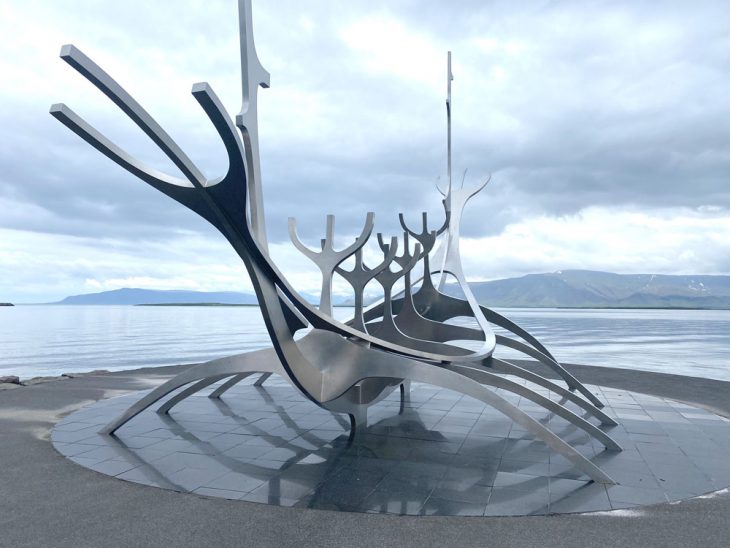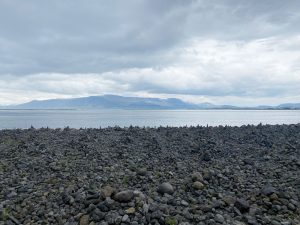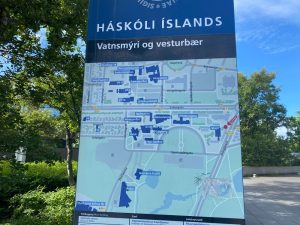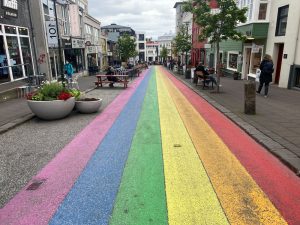
A Scientific Excursion in the Land of Fire and Ice
Vol. 25, Issue 01, 09 September 2022
When foreign visitors think about Iceland before their journey, they often mention volcanos, glaciers, hot springs, waterfalls, skyr, and Björk – and surely ice as well! Iceland seems to be a place of endless mysterious tales, and stories, with a derived from the strong contrast between the light and the darkness. It is true that when a traveler takes a bus form Keflavik Airport to downtown Reykjavik, the landscape is unique. There are no trees, or wood, but just stones, and hills around you. Scarcity of dwellings is typical in Finland as well, but in Iceland it is more visible as there are no forests hiding the emptiness.

Besides these well-known attributes, in Iceland there is a well-working education system as well. In Iceland, an education system has been created in which education should is granted to all irrespective e.g., area of residence. This is important as the country is truly not densely populated as there are lots of small villages scattered around the countryside. When it comes to higher level studies, in Iceland there are two universities, one is situated in Reykjavik (University of Iceland), and the second one is located in the northern part in Akureyri (a small institution with just some 1500 students). University of Iceland (Haskoli as the Icelandic people call it) is providing a basis for their mission and education by claiming that they try to be a better university for a better society. As a target for providing higher education, the statement – in its simplicity – sounds good.

In the beginning of June, I participated to an international conference, which was organized by NOFOMA (a society and community of mainly Nordic researchers within a field of logistics and SCM), and University of Iceland (Faculty of Industrial Engineering, Mechanical Engineering and Computer Science). Despite of its origin, the conference gathers together many logistics researchers around the world though the majority of the participants come from Scandinavia. The current conference was important as finally the researchers had an opportunity to F2F dialogue with their peers. Due to the COVID, earlier conferences were held online.
My own scientific article, that I also presented, was dealing with the responsibility- related issues with a title ‘Potential Contribution of Global Ethics in Contemporary SCM: an Educational Perspective.’ Considering my own interests – both scholarly and personally – the content of my paper and its articulation was probably not a surprise for people who know me. Theoretical discussion was supplemented with empirical evidence. Some of my DIB-students at XAMK, who took a course in sustainability- related SCM course, wrote ethical statements in the final phase of their studies, which provided valuable information to me as a researcher. The texts were subsequently coded and analysed to increase understanding on how students truly embrace the issues and challenges of responsibility in their own life and in their studies. Despite of the fact that generally students seem to have positive attitudes towards sustainability, responsibility, and integrity, they were also conscious about the other sides as well. This is important observation as within a framework of global ethics, human behaviour is not only related to efficiency, profits, and the selfish purposes of fulfilling financial objectives, but rather to human aspirations for making a positive difference in the world we all live in.
I will be retired quite soon, and therefore I do not have any opportunity to develop new courses or interorganizational collaboration within a framework of global ethics (actually, had one open course in Academic Year 2021), but I’d like to emphasize the significance of this discipline at XAMK. When our educational organisation gradually increases its engagement in sustainability, responsibility, and integrity related topics, there is also space for universal ethics as well both in terms of education and research. Consider my advice: take this challenge positively both as an instructor and as a student!

From a potential visitor point of view, there is a question: is Iceland worth visiting? If you are keen on outdoor life, strolling and hiking in wild landscapes and walking trails, the answer is: definitely yes. Strong contrasts in the natural environment prevalent across the country might give unforgettable experiences for a bold traveler. Due to tight conference schedule, I did not have any opportunity visit e.g., Thingvellir (Þingvellir as the local people write it), which is one of the most notable natural parks in the country in the proximity of capital Reykjavik. If you don not have much time, Reykjavik itself is interesting, and might take some days to explore it carefully. And yes, in comparison to other capital cities, it is truly a tiny town.

The flipside is that Iceland is not a cheap country for a visitor, who is afraid of spending too much money during the vacation. To exemplify, after the conference I went to a local bistro and had fish as a meal (grilled cod with some nice and well-cooked vegetables), the price was about 30 € (to be honest, I supplemented my meal with a glass of local Viking beer, which is brewed in Akureyri ….). It is quite a big sum of money for a budget-traveler. In addition, the hotel nights are quite pricy unless you don’t want to do camping in your own tent. This might be a good option as there are various camping sites around the island and it also provides an opportunity to discover diverse regions in the island. Despite of the well-working bus network, a car rental (even AWD- car) is almost a must as some of the most remarkable spots are in remote areas. Whatever you do, take harsh weather conditions, winds, and constant rainfalls into consideration, when you preplan your stay. Think carefully in advance what you wear, as you might feel all the seasons in one trip. If you forget to pack your baggage adequately, you can buy a lopapeysa (Icelandic sweater), which will you keep warm. Despite of the challenges with the adverse weather, in Iceland a visitor will have a unique traveling experience – something that the other spots can not offer. Peace and landscape as reflections of the nature are even magical and hence dissimilar to those that you’ll see in other countries (excluding perhaps the Nordic countries, though).

P.S. If you are interested in music, take my advice, and consider two Icelandic musicians. Ólafur Arnalds is a well-known compositor and multi-instrumentalist, who has created his own musical style, which puts together strings, piano, and other instruments in a harmonious manner. Often, the result is close to a modern ambient sound. The second one is pianist Víkingur Ólafsson – his fresh interpretations on the works by Bach are incredible.
Dr. Markku Nikkanen
Principal Lecturer, Xamk
- Learning and Growth Mindset - 13th September 2024
- Another successful meeting – IBSEN meets XAMK in Kouvola, May 2024 - 16th May 2024
- Blending and joining the Finnish work life - 8th December 2023
